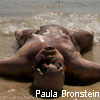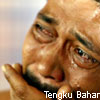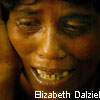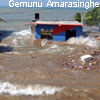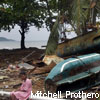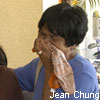 |
→ January 2005 Contents → Dispatches
|

|
||||||||||||||||||||||||
|
||||||||||||||||||||||||
EDITOR'S NOTE: No one, it seems, was ready. Not the children, not their parents and grandparents, not the journalists. Even those who've seen death in quantity were not prepared to see how suddenly it overtook so many. "Unthinkable, horrific," said one. "...just could not believe my eyes. I have never seen anything like this before," emailed another. Newer members of the news profession who worked the tsunami story had to overcome their inexperience. Photojournalists with plenty of experience said the logistical problems of travel time and transmission gremlins doubled the difficulties of covering a story so intense and far-flung. "Everything was slow, and there was no time to sleep." How to communicate a reality that even the UN Secretary General admitted is hard to understand? "You wonder where are the people? What has happened to them?" asked Kofi Annan. When you discover what happened, how do you shoot this awful thing, if the "thing" is a person? Bearing the burden of witness this month were Mitchell Prothero in Colombo, Sri Lanka, and Jean Chung in Thailand for World Pictures News, Elizabeth Dalziel and Gemunu Amarasinghe in Sri Lanka for the Associated Press, Paula Bronstein in Thailand for Getty Images, and Tengku Bahar, who was on temporary duty in Malaysia for Agence France-Presse the day the tidal wave overtook his part of the world. There are no words to describe it, but somehow they did. ALSO this month, Michael Kamber and Spencer Platt put the new year in perspective, while Janis Pipars filed from the front line of the Ukraine's "Orange Revolution" in Kiev a dispatch that you will either love or hate, depending on your personal outlook on assertive photographers in a media scrum. Our contributors this month went the extra quarter inch (I doubt there was a mile left in anybody) to bring you their stories, and their agencies supported them by assisting us at the Digital Journalist, to bring you voices of the Fourth Estate. They deserve our attention and our thanks.
AMY MARASH |
||||||||||||||||||||||||
Donate to UNICEF's Tsunami Relief effort »Go to the Dispatches archiveBack to the Contents Page |
||||||||||||||||||||||||
